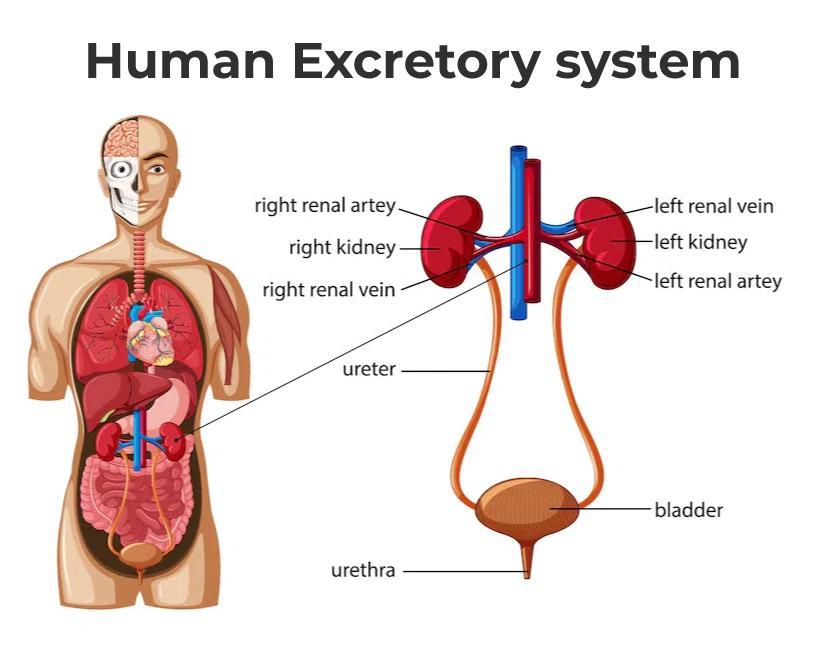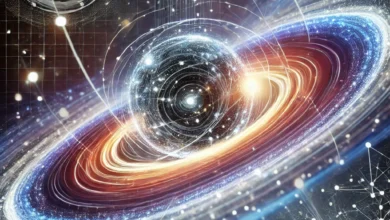The Human Excretory System – How Our Body Removes Waste

The human excretory system is one of the most important systems in our body. The human excretory system helps remove waste products and keeps us healthy. Without it, harmful toxins would stay inside our body and make us sick.
This system includes different organs like the kidneys, bladder, skin, and lungs. Each of these organs plays a special role in getting rid of waste. Our kidneys filter blood, the bladder stores urine, and the skin removes sweat. Even our lungs help by removing carbon dioxide when we breathe out. In this blog, we will learn about how the excretory system works, why it is important, and how to keep it healthy.
Table of Contents
What is the Human Excretory System and Why is it Important?
The human body constantly produces waste that needs to be removed. The human excretory system ensures that harmful substances do not stay inside the body.
This system helps remove excess water, salts, and toxins. Without proper waste removal, our organs would stop working properly. It also helps maintain the right balance of water and minerals in our body.
The excretory system also protects us from infections. If waste stays in our body too long, bacteria can grow and cause diseases. Keeping this system healthy is very important for overall well-being.

How the Kidneys Filter Blood and Produce Urine
Kidneys are the most important part of the excretory system. These two bean-shaped organs work like filters, cleaning our blood.
Each kidney has millions of tiny filters called nephrons. They remove waste, excess salt, and extra water from the blood. This waste turns into urine, which is sent to the bladder.
The kidneys also help control blood pressure. They make sure our body has the right amount of fluids and minerals. Drinking enough water is key to keeping the kidneys healthy.
The Role of the Bladder in Storing and Releasing Urine
The bladder is a small, flexible organ that stores urine before it leaves the body. It works like a balloon that expands when it fills up.
Urine travels from the kidneys to the bladder through thin tubes called ureters. The bladder can hold urine for a few hours. When it is full, we feel the urge to urinate.
A muscle called the sphincter keeps urine inside the bladder until it is ready to be released. Keeping the bladder clean and healthy prevents infections and discomfort.
How the Skin Helps Remove Waste Through Sweat
The skin is not just for covering our body; it also helps remove waste. It releases sweat, which contains water, salts, and small amounts of toxins.
Sweat glands in the skin produce sweat when we are hot or exercising. This helps cool down the body and remove excess salt.
Drinking enough water and staying clean helps the skin do its job. If the skin does not remove sweat properly, toxins can build up and cause skin problems.
The Lungs as an Excretory Organ – Breathing Out Carbon Dioxide
The lungs help remove waste gases from the body. When we breathe, we take in oxygen and release carbon dioxide.
Carbon dioxide is a waste gas that comes from the energy-making process in our cells. If too much of it stays in the body, it can be harmful.
Breathing deeply and exercising helps the lungs work better. Clean air is also important for lung health and proper waste removal.
The Digestive System and Its Role in Removing Solid Waste
The digestive system also plays a role in excretion. It removes solid waste from the food we eat.
The intestines absorb nutrients, and the leftover waste becomes stool. This waste leaves the body through the rectum and anus.
Eating fiber-rich foods and drinking water helps the digestive system remove waste smoothly. A healthy diet prevents constipation and other digestive problems.
How the Liver and Large Intestine Help in Excretion
The liver and large intestine work together to remove toxins and waste. They process food, filter harmful substances, and make sure nutrients are properly used.
The Liver’s Role
- Filters toxins from the blood
- Helps break down fats and proteins
- Converts harmful substances into safe waste
The Large Intestine’s Role
- Absorbs water from digested food
- Forms solid waste (stool)
- Removes undigested food and bacteria
Taking care of the liver and intestines is important for a healthy excretory system.
Common Problems of the Human Excretory System
The excretory system can face many problems that affect waste removal. Some of the most common issues include:
- Kidney stones – Hard mineral deposits that cause pain
- Urinary tract infections (UTIs) – Bacterial infections in the urinary system
- Dehydration – Not drinking enough water, leading to waste buildup
- Liver diseases – Damage to the liver, affecting toxin removal
Staying hydrated, eating healthy, and practicing good hygiene can help prevent these problems.

Conclusion
The human excretory system is an essential part of keeping our body clean and healthy. It removes waste, toxins, and extra fluids to prevent harm. Each organ in this system has a special job, from filtering blood to releasing sweat.
Taking care of this system is important for overall well-being. Drinking enough water, eating healthy foods, and practicing good hygiene can keep the excretory system working properly. A healthy excretory system means a healthier life.
FAQs
Q: What are the main organs of the human excretory system?
A: The main organs are the kidneys, bladder, skin, lungs, liver, and intestines.
Q: How do the kidneys clean the blood?
A: The kidneys filter waste and extra water from the blood, turning it into urine.
Q: Why is sweating important for the excretory system?
A: Sweating removes excess salts and toxins and helps cool down the body.
Q: What happens if the excretory system does not work properly?
A: Waste builds up in the body, leading to infections, kidney problems, and other health issues.




